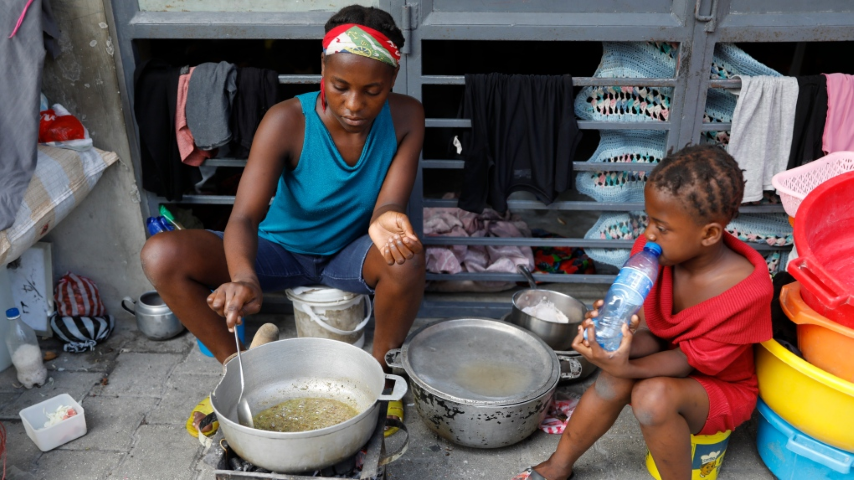
On Friday, March 8, 2024, in Port-au-Prince, Haiti, a woman is seen cooking at a shelter for families displaced by gang violence. The ongoing violence, with anti-government gangs clashing with police, has severely impacted Haiti's economy, making it challenging for many vulnerable individuals to access food. (AP Photo/Odelyn Joseph)
Amidst escalating gang violence, Haiti teeters on the brink of a humanitarian catastrophe, with four million people facing acute food insecurity, warned Jean-Martin Bauer, the UN's food agency director in the troubled nation. A staggering one million individuals stand on the precipice of famine, highlighting the dire urgency of the situation. The recent surge in violence has uprooted an additional 15,000 people in Port-au-Prince, exacerbating an already dire scenario. With the capital essentially besieged by gang control, essential services are paralyzed, leaving residents stranded and vulnerable. The closure of vital lifelines such as the port and airport further compounds the crisis, rendering aid delivery increasingly precarious.
Bauer underscored the critical need for immediate action, emphasizing that the World Food Program (WFP) and its partners have initiated emergency measures to provide meals to the newly displaced. However, dwindling supplies threaten to derail these efforts, with the WFP warehouse facing imminent depletion unless access to the port is restored. The reliance on food imports, which constitute half of Haiti's food supply, exacerbates the situation, with escalating prices amplifying the suffering of already impoverished communities. Disruptions in trade routes due to violence have led to soaring food prices, plunging households deeper into despair as incomes dwindle.
The economic repercussions extend far beyond the confines of the capital, as rural areas grapple with severed ties to Port-au-Prince and dwindling resources. Bauer cautioned against solely focusing on security, stressing the imperative of a robust humanitarian response to avert catastrophe. However, funding remains grossly inadequate, with the UN's humanitarian appeal for Haiti scarcely receiving a fraction of the required amount.
Despite the grim outlook, there are glimmers of hope amidst the chaos. Local procurement initiatives enable the WFP to sustain vital programs such as school feeding schemes, providing a lifeline to vulnerable populations. Despite the challenges posed by violence, innovative approaches such as mobile money transfers facilitate aid distribution to those in need.
However, the situation remains precarious, with essential services such as healthcare teetering on the brink of collapse due to the rampant violence. Blood shortages underscore the urgency of the crisis, as efforts are underway to procure supplies from neighboring countries to mitigate the looming catastrophe.
As Haiti grapples with escalating violence and crippling food insecurity, the international community faces a stark choice: to intervene decisively and avert a humanitarian catastrophe or to stand idly by as millions teeter on the brink of famine.















